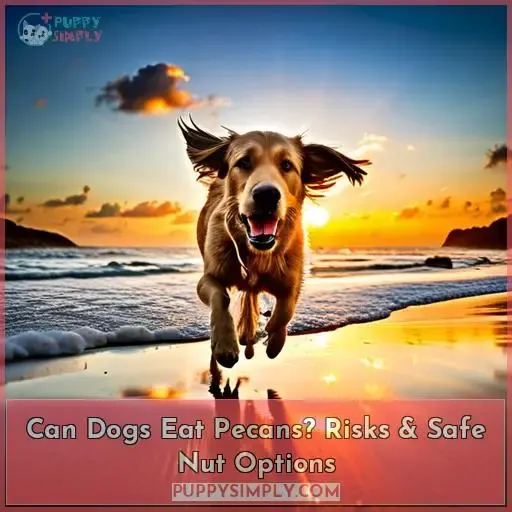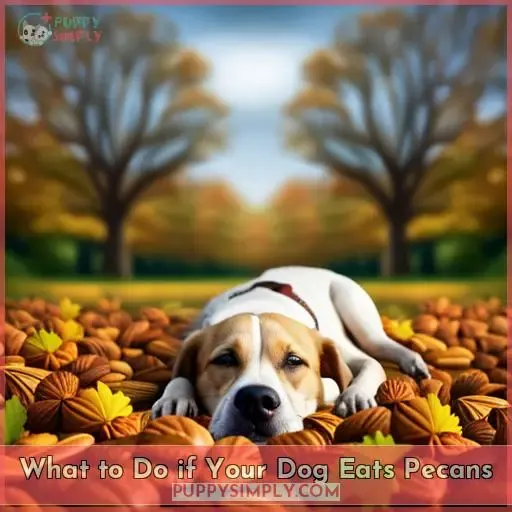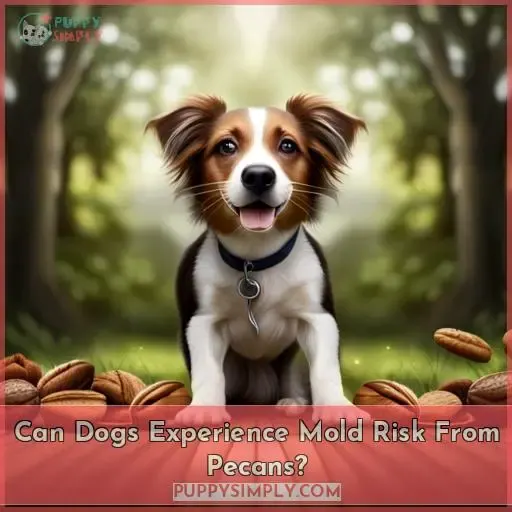This site is supported by our readers. We may earn a commission, at no cost to you, if you purchase through links.
 Have you ever wondered if it’s safe for your furry best friend to eat pecans? While these tree nuts are a healthy snack for humans, they can be very dangerous and even fatal to dogs. Even in small amounts, the toxins found in pecans can cause nausea, vomiting, and other serious health issues.
Have you ever wondered if it’s safe for your furry best friend to eat pecans? While these tree nuts are a healthy snack for humans, they can be very dangerous and even fatal to dogs. Even in small amounts, the toxins found in pecans can cause nausea, vomiting, and other serious health issues.
So what should you do if your dog eats some of these nuts? Keep reading as we explain why dogs shouldn’t have pecans and provide safer nut options that won’t harm their digestive system or overall health.
Table Of Contents
Key Takeaways
- Pecans are unsafe for dogs due to toxins like juglone and mycotoxins.
- Pecans can lead to choking, especially in smaller or ill dogs.
- The high fat content in pecans can cause pancreatitis in dogs.
- Safe alternatives for dogs include unsalted peanuts, cashews (in moderation), and unsalted almonds.
Are Pecans Safe for Dogs?
When it comes to pecans, you should exercise caution with your dog. Not only do they contain juglone, a harmful compound that can cause gastrointestinal issues if ingested by dogs, but there is also the risk of choking and high-fat content, which could lead to pancreatitis.
Toxic Risk
You must take caution when it comes to pecans, as they can cause severe health issues for your beloved pet. Toxic risks include: juglone, a harmful compound; choking hazard due to their small size; and high fat content leading to pancreatitis.
Additionally, mold on pecans may contain mycotoxins which can induce tremors or seizures in dogs. Symptoms such as loss of appetite or stumbling should be monitored closely, and vet consultation is necessary if ingestion occurs.
Safe alternatives are unsalted peanuts (no xylitol), cashews (occasional treat), and slivered/sliced almonds (unsalted and unflavored).
Choking Hazard
Be aware that pecans pose a choking hazard due to their small size, so exercise caution when considering giving them to your pet. Pecans can cause pancreatitis in dogs due to the high fat content, leading to vomiting and lethargy.
Additionally, there is a risk of mold toxicity if they are not handled properly. Mycotoxins from mold can cause tremors and seizures in dogs. Nutritional concerns must also be taken into account for any type of nut given as treats or snacks for your dog.
Safe alternatives such as unsalted peanuts (no xylitol), cashews (occasional treat), or slivered/sliced almonds (unsalted and unflavored) should be considered instead of pecans.
High Fat Content
The high fat content in pecans can cause pancreatitis in your pup, leading to symptoms like vomiting and diarrhea. Dogs are particularly sensitive to the effects of dietary fat, which is why it’s important to be aware of potential risks associated with feeding them foods that contain a lot of it.
Eating just a few pecans could trigger an attack as their pancreas struggles with breaking down such high levels. This is especially true for smaller dogs or those who already have health issues.
The mycotoxins found on certain types of moldy nuts can also be dangerous. So, if you think your dog has eaten any amount, seek medical advice immediately.
Keep all forms of nuts out of reach from pets and stick to lower-fat treats instead!
What to Do if Your Dog Eats Pecans
If your dog has consumed pecans, it is important to take action. Contact a vet immediately for advice and look out for certain symptoms such as lethargy or vomiting. Other safe nut options include unsalted peanuts, cashews (as an occasional treat), and slivered/sliced almonds (unsalted and unflavored).
Contacting a Vet
If your dog has consumed pecans, it’s best to contact a vet right away. Even small amounts of the nut can cause an allergic reaction or nutritional concerns. If you suspect that the pecan was moldy, seek immediate medical help as mycotoxins may lead to tremors and seizures in dogs.
Alternatives like unsalted peanuts (no xylitol) and cashews make for suitable treats in moderation but should always be discussed with your vet beforehand.
A veterinarian visit is paramount when considering any changes or additions involving pet nutrition, so ensure you reach out for professional advice before serving up those tasty nuts!
Symptoms to Look For
Look out for signs of gastric distress, such as vomiting and diarrhea, if your pup has eaten pecans. Common symptoms to look for include loss of appetite, stumbling, or tremors from toxic mold effects.
Always seek veterinary advice immediately if you suspect that your pet has ingested any amount of pecan shells or nuts.
Additionally, consider alternative nut options like unsalted peanuts (no xylitol), cashews (occasional treat), and slivered/sliced almonds (unsalted and unflavored). Peanut butter is also a safe option in moderation; however, it should be free from sugar substitutes like Xylitol, which can be harmful to dogs.
Keep safety tips in mind when introducing new foods to ensure the well-being of both yourself and your pet!
Other Safe Nut Options
Try giving your pup some peanuts, cashews, or slivered almonds as an occasional treat. Nuts are a great source of protein and can provide numerous nutritional benefits to dogs.
You can also look up dog-safe recipes that incorporate nuts into their diets safely. Just be sure all nuts are unsalted and unflavored before offering them as treats or snacks to avoid any potential health risks from toxins like juglone found in pecans.
Your furry friend will thank you for the tasty (and healthy) snack!
Can Dogs Eat Pecan Pie?
Pecan pie is an absolute no-no for pooches, packed as it is with high fat and sugar. This can spell disaster for their health, increasing the risk of pancreatitis in dogs or even causing them to choke on pecans.
The ingredients found in this holiday treat are a definite danger – from butter and oil to refined sugars and salt; all of which can be toxic if consumed by your pup. Plus, there’s always the potential that mold on pecan shells could produce mycotoxins leading to tremors or seizures in pets if ingested.
When looking for dog-friendly desserts instead of traditional pies such as pecan, try something like peanut butter cookies made without any added sugars or salts that may be tasty yet safe enough for your furkid’s diet! Just remember: when introducing new foods into your pet’s life, make sure you check with a vet first so you know exactly what they should—and more importantly shouldn’t—be eating!
Can Dogs Experience Pancreatitis From Pecans?
Consuming pecans can lead to pancreatitis in dogs, a condition characterized by vomiting, diarrhea, and lethargy. The high-fat content of the nut is to blame for this risk, along with its juglone compound that may trigger an allergic reaction in some pets.
Smaller breeds and senior dogs, as well as those with existing health concerns, are most at risk from developing pancreatic issues after consuming pecans or other nuts. It’s important to note that just because a type of nut is safe for humans doesn’t mean it’s also suitable for canine consumption.
Peanuts, cashews, and sliced almonds are three examples of dog-safe varieties if given only occasionally as treats.
Prevention tips include keeping all types of nuts out of reach from your pet. Moldy pecan shells should never be consumed due to their mycotoxins, which can cause tremors or seizures in animals, or the potential presence of aflatoxins on contaminated shells.
If you’re ever concerned about your pup eating any kind of nut, then contact your vet immediately so they can advise accordingly on how best to proceed going forward.
Can Dogs Experience Mold Risk From Pecans?
It’s important to be aware of the mold risk associated with pecans. Moldy pecans can contain mycotoxins, which are toxic compounds produced by fungi that can cause tremors and seizures in dogs if ingested.
Aflatoxin is a particularly dangerous toxin found on the shells of certain nuts, including pecans. Therefore, it’s important to inspect your pet’s food for signs of mold before feeding them any type of nut-based treat.
Symptoms resulting from ingestion may include vomiting, diarrhea, and lethargy. Even small amounts should not be taken lightly, as some breeds, such as seniors or those with health issues, are more affected than others when exposed to toxins like these.
To prevent your pup from ingesting potentially harmful molds on their food items, opt for fresh produce instead and avoid leaving nuts out where they might become contaminated over time.
If you think your dog has inadvertently consumed a moldy snack containing Aflatoxin or other chemicals, always contact your veterinarian immediately.
Other Safe Nut Options for Dogs
When considering what nuts are safe for your canine companion, peanuts, cashews, almonds, and hazelnuts may come to mind. While these treats should be given in moderation and with a veterinarian’s approval due to the high-fat content they contain, all four of these nuts can make great occasional snacks for dogs when offered without salt or added flavors.
Peanuts
Enjoying a handful of unsalted peanuts is an occasional treat that can give your pup the energy they need to keep up with their active lifestyle! Peanuts are not only safe for dogs, but they also provide lots of protein and healthy fats.
However, beware if your pup has peanut allergies or sensitivities. Monitor them closely when trying out new treats. Consider using plain peanut butter as a delicious treat – just make sure it doesn’t contain any xylitol, as this can be toxic to pets.
Peanut-based snacks offer many benefits for pet health and overall wellbeing, so why not try introducing some into their diet today?
Cashews
Treat your pup to a handful of cashews for an occasional snack. Cashew nuts are safe as long as they’re unsalted and unflavored, providing some nutritional benefits like protein, healthy fats, vitamins, and minerals.
However, there is always the potential for allergies, so be sure to watch out for any reactions after feeding them. Cashews should only be given occasionally due to their high-fat content, which can lead to weight gain or pancreatitis in dogs if consumed too often.
Almonds
Slivered or sliced almonds make for a great occasional treat for your pup, as long as they are unsalted and unflavored. Almonds provide essential fatty acids, vitamins B2 and E that can benefit your dog’s skin, coat, and joint health.
When feeding them to a pooch, it is important to stick with small portions since too many can lead to an upset stomach or digestive issues.
Hazelnuts
Although hazelnuts can be a tasty snack, they should only be offered as an occasional treat for your pet due to their high-fat content. It is important to consider the nutritional value of hazelnuts and how they compare to other nuts like pecans before making them available.
Be aware of potential allergies in pets and ensure that any recipes using hazelnuts are safe for dogs.
Conclusion
It’s understandable why you may be considering giving your pup a pecan treat, but it’s important to know that these nuts are not safe for dogs. Pecans contain juglone, a toxic compound, and pose a choking hazard due to their size.
The mold on pecans can produce mycotoxins that can lead to tremors and seizures. If your pup has eaten pecans, consult a vet right away and look out for symptoms like vomiting or lethargy.
To stay on the safe side, there are several other nut options for dogs, such as unsalted peanuts, cashews, and almonds.












